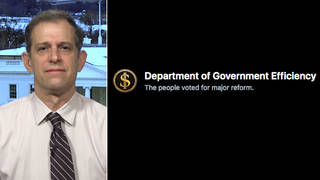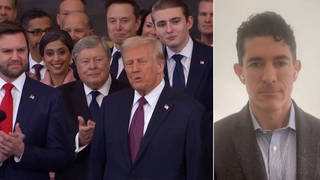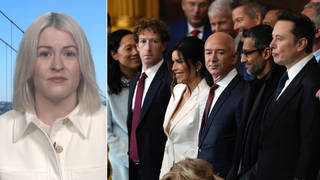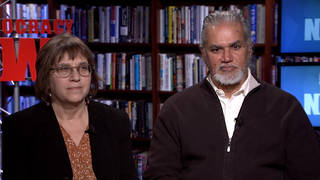
Related
Topics
Guests
- Bethany McLeana contributing editor at Vanity Fair. She is a former editor-at-large and columnist for Fortune magazine, where she helped expose the 2001 Enron scandal. She is co-author of The Smartest Guys in the Room.
Bernard Madoff, the convicted mastermind behind one of the biggest financial frauds in US history, was ordered Monday to serve 150 years in prison, the maximum sentence allowed. Madoff pleaded guilty in March to running a massive Ponzi scheme that defrauded investors of some $50 billion. Federal District Judge Denny Chin said it was important that the severity of the sentence serve as a deterrent to future offenders. We speak with financial journalist, Bethany McLean of Vanity Fair. [includes rush transcript]
Transcript
ANJALI KAMAT: Bernard Madoff, the convicted mastermind behind one of the biggest financial frauds in US history, was ordered Monday to serve 150 years in prison, the maximum sentence allowed.
Madoff pleaded guilty in March to running a massive Ponzi scheme that defrauded investors of some $50 billion. The eleven criminal counts against him include fraud, money laundering, perjury, false filing with the Securities and Exchange Commission, and other crimes.
Shortly before receiving his sentence, Madoff offered an apology, saying, quote, “I live in a tormented state for all the pain and suffering I created. I left a legacy of shame. It is something I will live with for the rest of my life.”
Federal District Judge Denny Chin then sentenced the seventy-one-year-old Madoff to 150 years behind bars, three times as long as the federal probation office suggested and more than ten times as long as defense lawyers had requested. Chin said it was important that the severity of the sentence serve as a deterrent to future offenders and that, quote, “The message must be sent that Mr. Madoff’s crimes were extraordinarily evil.”
Madoff was the former chairman of the NASDAQ stock exchange and a respected figure on Wall Street for nearly half a century. In Washington, regulators had sought his advice on any number of regulatory issues over the years.
Many victims of the Ponzi scheme broke out in applause after the sentence was announced. Outside the courtroom, they praised the sentence but were skeptical that it would help prevent future fraud. This is Madoff victim Richard Friedman.
RICHARD FRIEDMAN: I thought it was a good decision, nothing for me to get overjoyed about. I really don’t — again, Madoff is in my past. I just thought it sends a good message, but it’s only a message. Will this stop other people from doing Ponzi schemes in the future? I don’t think so.
ANJALI KAMAT: Ellen Bernfeld, another Madoff victim, said the financial system itself needed to change.
ELLEN BERNFELD: The fact that Bernie Madoff is going to be — spend the rest of his life in jail, you know, that’s a good thing, right? But it doesn’t repair the damage done. And it doesn’t repair the broken system that allowed it to happen.
AMY GOODMAN: For more, we’re joined on the phone by financial journalist Bethany McLean. She’s a contributing editor at Vanity Fair and former editor-at-large and columnist for Fortune magazine, where she helped expose the 2001 Enron scandal. She is co-author of The Smartest Guys in the Room. She joins us from Chicago.
Welcome to Democracy Now! and congratulations on your new baby, Bethany.
BETHANY McLEAN: Thanks for having me on the show.
AMY GOODMAN: Well, thanks for taking the time to talk to us. So, here you watch from home the sentencing of Bernard Madoff. I’d like you to comment on that and the 150-year sentence, but then go to this bigger issue of if only there were a Madoff to blame for the global economic meltdown.
BETHANY McLEAN: Yes, well, the 150 years is obviously largely symbolic. Madoff is likely to live less than fifteen years; his lawyer said even less than that. But I think it does send an important message. Whether it serves as a deterrent or not is a big open — big open question. You’ve seen a rapid increase in the sentences that white-collar criminals have gotten, and I don’t think you’ve seen any slowdown in the amount of fraud. I remember writing, after the verdicts in the Enron case, saying that these verdicts would send a huge message to Wall Street that operating in the grey zone was no longer permissible and would be punished. And I’ve been proven radically wrong no shorter than five years later, so — not even five years later, three years later. So I’ve become a lot more skeptical about the idea that anything is a deterrent to white-collar fraud.
But to your larger point, I think in some ways there is something almost reassuring about the Bernie Madoff case, in that it’s a case where investors lost enormous amounts of money, people’s lives have been wrecked, but there’s someone to blame. There’s someone we can hold up and say, “Here is a man who is extraordinarily evil.” And yes, there are larger questions here about the failure of the system, the failure of the SEC, but when you take a look at this whole financial crisis, which has wiped out untold amounts of investors’ money, it’s very hard to hold any one person accountable, because so much of the system is to blame. And it’s very hard to say that there’s going to be any satisfaction at the end of the day. There won’t be any standing up in a courtroom and cheering when somebody is sentenced to 150 years in jail, because it’s going to be much more difficult to say, “This person is responsible for what happened to our global financial system.”
ANJALI KAMAT: Well, I want to play a clip of a whistleblower who testified before Congress in February that he had repeatedly alerted the SEC about his suspicion that Madoff was operating a gigantic fraud. This is Harry Markopolos, an independent financial fraud investigator.
HARRY MARKOPOLOS: My team and I tried our best to get the SEC to investigate and shut down the Madoff Ponzi scheme with repeated incredible warnings to the SEC that started in May 2000, when the Madoff Ponzi scheme was only a $3 billion to $7 billion fraud. We knew then that we had provided enough red flags and mathematical proofs to the SEC for them, where they should have been able to shut him down right then and there at under $7 billion. But unfortunately, the SEC staff lacks the financial expertise, and it’s incapable of understanding the complex financial instruments being traded in the twenty-first century.
In October 2001, when Madoff was still in a $12 billion to $20 billion range, again we felt confident that we had provided even more evidence to the SEC, such that he should have been stopped at well under $20 billion. And again, in November 2005, when Mr. Madoff was at $30 billion, twenty-nine red flags were handed to the SEC, and yet again they failed to properly investigate and shut down Mr. Madoff’s operation. Unfortunately, as they didn’t respond to my written submissions in 2000, 2001, 2005, 2007 and 2008, here we are today. A fraud that should have been stopped at under $7 billion in 2000 has now grown to $50 billion.
AMY GOODMAN: That’s Harry Markopolos. He was testifying in February. Your comment, Bethany McLean?
BETHANY McLEAN: I think it’s just shocking. There have been complaints for a long time about the SEC’s ability and willingness to police financial fraud, and there are many tales of investors who discover frauds at companies send detailed packages to the SEC laying out why there’s a problem at these companies, only to see no action taken and the company eventually go bankrupt and wipe out investors’ money. And a lot of this doesn’t get any attention, because they’re small companies under the radar screen, but people in the investment community complain repeatedly that they simply can’t get the SEC to take a skeptical approach to business.
And when you read Markopolos’s memos, it’s even more shocking in this particular case, because he provides a list of names, of contacts of people for the SEC to talk to to verify what he’s saying. And it seems that the SEC just didn’t follow up on that and was just unwilling to believe that this could be true. And I think that speaks to a deeper issue with the SEC, which seems to be an unwillingness to be skeptical, an unwillingness to believe that people really do these things, that people are really committing these frauds, and that they need to take a more skeptical approach to the people they’re in charge of policing. It seems, instead, to be the ultimate definition of regulatory capture, where the SEC often seems to be more on the side of those they’re supposed to regulate than on the side of those they’re supposed to protect.
AMY GOODMAN: Bethany McLean, do you see things are changing at all? I mean, you exposed Enron in 2001. It’s now 2009. Where do you see the regulations need to be put in place?
BETHANY McLEAN: You know, I’ve become a lot more skeptical, and I hate to sound cynical and pessimistic, but I guess I am. At the time of Enron, I was young, and I remember writing at the time that, wow, this has been a great lesson learned. And, you know, if something is too good to be true, then — if something seems to be too good to be true, then it probably is. And I thought this was this amazing insight and discovery. And as it turns out, people are suckered time and time again, because people, including the Madoff victims, want to believe in something that is too good to be true. And as long as you have people who are willing to believe in something that’s too good to be true, you’re going to have people out there who are going to take advantage of that.
And as I had mentioned at the beginning of this, after the sentencing of Jeff Skilling and Ken Lay in the Enron case, I wrote a piece for Fortune saying that the rules — the rules had changed now, and everybody in the business community understood that it wasn’t OK to operate in the grey zone. And what is our financial crisis but a massive case of everybody in the system operating in the grey zone? And so, it turns out that the Enron case really was the canary in the coal mine, and the sentencing in the Enron case did absolutely nothing to deter anybody else from following — from going down the same path.
And I don’t know what the deterrent is. I am skeptical of the ability of more rules and regulations to fix the problem, because as we’ve seen with the SEC, it depends on the willingness of the enforcer to enforce the rules. And in the Obama administration’s new plan, they’re putting an awful lot of faith in the Federal Reserve to be this overseer, but it’s the Federal Reserve that missed a lot of the problems that were developing in our economy, and the New York Fed, in particular, which was in charge of regulating banks like Citigroup and Merrill Lynch and didn’t see these problems coming. So I don’t know how you can look at a system where the regulators failed to regulate and say more regulation is going to be the answer.
AMY GOODMAN: Bethany McLean, I want to thank you for being with us, contributing editor at Vanity Fair, former editor-at-large and columnist for Fortune magazine, helped expose the 2001 Enron scandal, co-author of The Smartest Guys in the Room, and a new mom.












Media Options